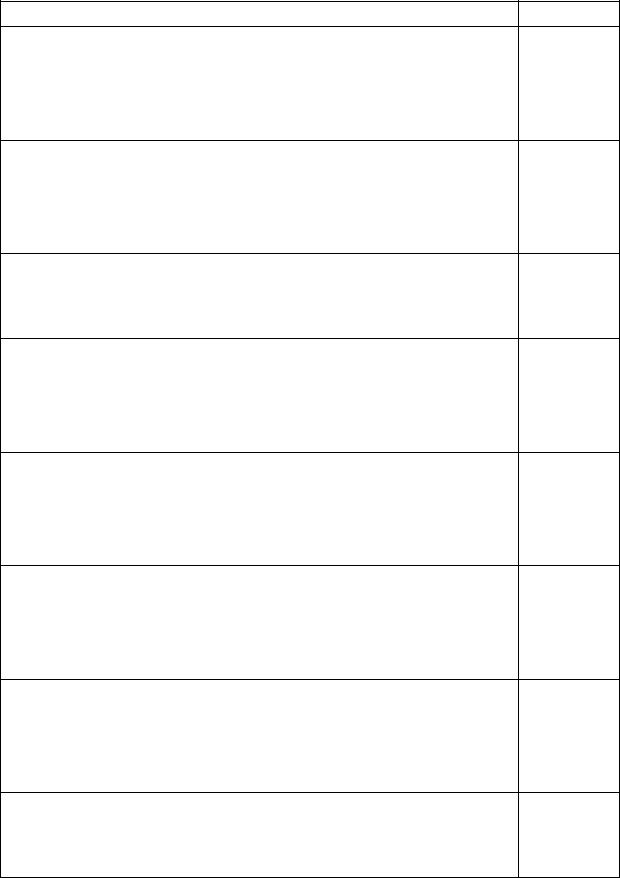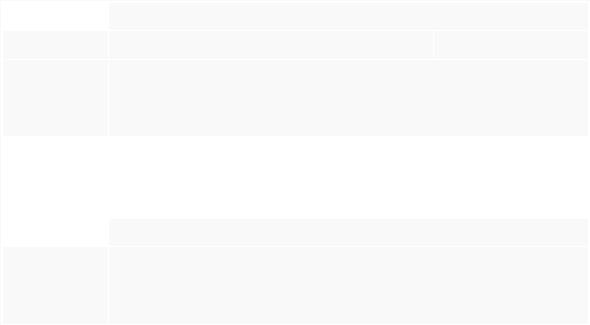
Мамонтова Н. Ю. Деловой иностранный (английский) язык.pdf
.pdfМинистерство образования и науки РФ Федеральное государственное бюджетное образовательное
учреждение высшего профессионального образования «Кузбасский государственный технический университет имени Т. Ф. Горбачёва»
Составитель Н. Ю. Мамонтова
Деловой иностранный (английский) язык:
Учебное пособие для студентов магистратуры всех направлений подготовки
Рекомендовано учебно-методической комиссией направления 240100.68 «Химическая технология» в качестве электронного учебного пособия
Кемерово 2013
Рецензенты:
Стрельников П. А.– доцент кафедры иностранных языков Черкасова Т. Г.– председатель учебно-методической комиссии
направления 240100.68 «Химическая технология»
Мамонтова Наталья Юрьевна. Деловой иностранный (английский) язык: учебное пособие [Электронный ресурс] : для студентов магистратуры всех направлений подготовки / сост. Н. Ю. Мамонтова. – Электрон.дан. – Кемерово :КузГТУ, 2013. – 1 электрон.опт. диск (CDROM) ; зв. ; цв. ; 12 см. – Систем. требования : Pentium IV ; ОЗУ 8 Мб ; Windows 93 ; (CD-ROM-дисковод) ; мышь. – Загл. с экрана.
Целью учебного пособия является обучение студентов магистратуры всех направлений подготовкипрактическому владению деловым иностранным языком в сфере профессионального общения.
©КузГТУ ©Мамонтова Н. Ю., составление, 2013
1

CONTENTS
Предисловие
APPLYING FOR A JOB
Curriculum Vitaes
Cover Letters
Job Interviews
SIGNING A CONTRACT
Contracts
Contract Clauses
Sample Contracts
MAKING A PRESENTATION
What makes a good presentation
Self-presentations
NEGOTIATING
Preparing to Negotiate
Negotiating Across Cultures
Negotiating Styles
TRAVELLING ON BUSINESS
How To Survive While Traveling
Avoiding Etiquette and Non-Verbal Errors
Dialogues 'Travelling'
TELEPHONING
Telephoning Across Cultures
Dealing With Tele Breakdowns
Dialogues 'Telephoning'
INTERNATIONAL BUSINESS COMMUNICATION
Cross-Cultural Communication
Cultural and Business Differences
Dialogues'International Relations'
BUSINESS CORRESPONDENCE
What Makes a Good Letter
Samples of Business Letters
2
Предисловие
Приоритетным направлением развития современного вузовского образования является подготовка специалистов, готовых и способных работать в конкурентных условиях современного производства и бизнеса, соответствующих требованиям работодателей, которые ждут на своих предприятиях молодых и профессионально-компетентных сотрудников. Профессиональная компетентность предполагает не только владение специальными знаниями, умениями, навыками и готовность их применения в условиях реального рабочего окружения. Способность и готовность к коммуникациям в различных сферах профессиональной и социальной жизни в свою очередь обеспечивают качественную, продуктивную и психологически комфортную работу специалиста, гарантируют чувство удовлетворенности от выполнения профессиональных функций и обязанностей.
Цель учебного пособия – формирование коммуникативной компетентности специалиста на основе компетентностного подхода к обучению в соответствии с требованиями ФГОС. Коммуникативная компетентность – это умение корректно выстраивать ролевое коммуникативное поведение адекватно ситуации общения на родном или иностранном языке. Основное внимание уделяется формированию базовых умений делового общения. Деловое общение – это не обязательно диалог между бизнесменами в деловых кругах или разговор на сугубо специфические узкие темы, это широкий спектр коммуникативных ситуаций в разноплановых целевых аудиториях, начиная от необходимости общения с руководством, коллегами, партнерами, клиентами и заканчивая неформальной встречей вне работы.
Тематика пособия подобрана в соответствии с рабочей программой дисциплины "Деловой английский". Структура пособия предоставляет преподавателю (во время аудиторной работы) и студенту (в качестве самостоятельной работы) возможность вариативно подходить к выбору необходимого раздела.
3
APPLYINGFORAJOB
Curriculum Vitaes
1.Work in groups. Discuss these questions.
1.What makes a good CV?
2.How long should it be?
3.What should it contain?
2. Read what a human resources manager says about CVs and compare your ideas in ex. 1.
There's lots of advice on CVs and a lot of it differs so it's hard to say exactly what the perfect CV is. I'd say a good CV should cover no more than two sides of A4 paper and be divided into clear headings. The first section should include personal details: name, address, telephone number, email and things. Some employers like to see a photo, too. You can always phone the company andfind out.
Next comes education and qualifications starting with the most recent things. The third section deals with work experience – again starting with the most recent job. I think it's important here to be brief so use bullet points and. You don't need to use complete sentences as long as it's very clear what you've done.
Following this is the section on professional skills. Show the employer your abilities, including your ability to use IT and foreign languages.
Finally, detail your interests. An employer likes to know what kind of person you are and things like team sports, for example, show this.
Perhaps the most important thing is to show how you meet the criteria in the job advertisement. Make it easy for the employer to ask you to an interview.
Presentation is also important. Good quality paper and a clear typeface make a difference. And once you've written your CV check your grammar and spelling carefully.
Use action verbs to describe your experience. They attract attention and demonstrate that you are an 'action' person. What are these typical action verbs in your language?
4

achieve |
|
introduce |
|
co-ordinate |
|
manage |
|
create |
|
organise |
|
develop |
|
plan |
|
direct |
|
research |
|
establish |
|
set up |
|
implement |
|
supervise |
|
3.Read the text again. Are these statements true or false? Correct any false statements. How is this advice different to CVs in your country?
1.A CV should be no longer than two pages.
2.You should always include a photograph.
3.You put the most recent experience first.
4.You should write in full sentences.
5.An employer is not interested in your hobbies and interests.
6.You should adapt your CV to the job description.
7.You should use good quality stationary.
8.You should make sure there are no grammar and spelling mistakes.
4. Now look at the CV. Doesit follow the advice above? Resume / CV
 Thomas Crown
Thomas Crown
Objective Seeking an International Sales Management position in Information Technology where my extensive sales experience will be used to the full
|
|
|
|
|
|
|
|
|
|
|
|
|
|
Experience |
|
2003- |
|
IntelelInc. |
|
London, UK |
|
|
present |
|
|
|
|
 NationalSalesManager
NationalSalesManager
• Increased sales from £60 million to £100 million.
•Implemented Internet sales grossing £25 million.
•Doubled sales per representative from £5 to £10
5

million.
 2001-2003 TeletronaSystems Edinburgh, UK
2001-2003 TeletronaSystems Edinburgh, UK
 NorthernSalesManager
NorthernSalesManager
• Increased regional sales from £95m to £200m.
•Suggested new services adding £35m to revenue.
•Expanded sales team from 30 to 60 representatives.
|
|
1999-2000 |
|
ESS Holdings |
|
Cambridge, UK |
 SeniorSalesRepresentative
SeniorSalesRepresentative
• Increasedsalesby 300% annually.
•Closed deals with 100 major new accounts.
•Won over 25 competitor clients - adding £50 million to revenue.
|
|
1996-99 |
|
ESS Holdings |
|
Cambridge, UK |
 SalesRepresentative
SalesRepresentative
• Increasedsalesby 300% annually.
•Awarded company's top sales award each year.
•Developed 'Winning Presentations' training course.
Education |
|
1992-96 |
|
LondonUniversity |
|
London, UK |
• BA,
BusinessAdministration&InformationSystems
• Captain of University Rugby Club
|
|
1988-92 |
|
StAndrew'sSchool |
|
Plymouth, UK |
• 4 GCE 'A' Levels
• President of school's Drama Society
Interests St Andrew's Board of Governors, rugby, drama, chess
17 King's Terrace, Richmond, Surrey, UK Tel: +44 181 123 456 Email: tc@repu.co.un
6
5. Draft your own CV using the sample form below. The words in italics will give you some ideas how to present each section in a CV.
|
Curriculum Vitae |
|
NAME |
|
DATE OF BIRTH |
ADDRESS |
|
NATIONALITY |
TELEPHONE |
|
SEX |
EDUCATION |
|
|
WORK |
|
|
EXPERIENCE |
|
|
June - August |
Merrill Lynch: Private Banking Intern |
|
1999 |
Skills gained: |
|
|
• working in a team |
|
|
• |
report writing |
|
• |
working to deadlines |
|
• |
supervision of others |
|
• |
liaison with clients |
ACTIVITIES & |
|
|
INTERESTS |
|
|
…… - ……. |
Cellist in school and college orchestra |
|
|
Skills gained: |
|
|
• |
performing in public |
|
• |
social skills |
…….. - …….. |
Publicity officer, College Geographical |
|
|
Society |
|
|
Skills gained: |
|
|
• |
managing a budget |
Summer 1998 |
• working to tight deadlines |
|
|
|
|
|
|
7 |
Travel round Eastern Europe
Skills gained:
•planning and organizing
•independence
ADDITIONAL |
|
|
SKILLS |
• |
clean driving licence |
|
||
|
• |
conversational French |
|
• computer literate, Microsoft Office, |
|
|
|
Excel and Word |
REFERENCES |
|
|
Prof. N Smart |
Mr T Davis |
|
Kings Charles College |
Merrill Lynch |
|
London WCIZ 9ZZ |
London EC3T 2NB |
|
(Tutor) |
(Employer) |
|
6. Show your СV to a partner / your teacher. Ask him or her to evaluate it using these check points.
1.Does it look good?
2.Does it list experience starting from the present?
3.Is it too long / too short?
4.Is the contact information clear?
5.Does it provide a good basis for an interview?
Cover Letters
1.A short cover letter should always accompany your CV. Organise the following advice into two categories, dos and don'ts.
1.Type your letter of application.
2.Use interesting coloured paper.
3.Write at least two pages.
4.Repeat what is already on your CV.
5.Point out professional skills that you have acquired.
6.Emphasise how you believe you meet the employer's needs.
8
7. Tell the employer that you will call in to discuss your application.
2. Read the text about writing cover letters and use the advice to complete the sentences below.
When writing cover letters you need to use a standard format. Remember that the address of the person you are writing to always appears on the left-hand side of the page and your address is in the top-hand corner. Put the date under your address.
Always make sure you start and end your cover letters correctly. If you are writing to Mrs Linda Carr then you should start the letter 'Dear Mrs Carr' and finish it with 'Yours sincerely'. Note that 'sincerely' has a small 's',not a capital letter.
If the advertisement asks you to send your application to Melanie, how would you begin your letter? 'Dear Melanie'? 'Dear MelanieThompson'? 'Dear Mrs Thompson is not really appropriate as she might not be married. It is probably safe to put 'Dear MelanieThompson'.
If the advertisement just says 'reply to J. Brown' how would you address theletter? 'Dear Sir'? or 'Dear Madam'? or 'Dear Mr Brown'? You should ring the company and find out J. Brown's name and whether this person is a man or a woman.
Remember that letter etiquette costs you nothing, but can really pat dividends and you may be the only person who has made the effort to find out. This could help to make you different from all the other applicants and being noticed is important if you are going to get invited for interview.
If the advertisement just states: 'Write to the Human Resources Department' or 'Reply to Atlas Travel' it may not be possible for you to find out who will be dealing with your reply. In these cases you will have to start your letter 'Dear sir / Madam' and finish the letter with 'Yours faithfully' with a small 'f'.
1.The address of the person the letter is addressed to appears
…………………………………. .
2.If you begin a letter with 'Dear Mrs Healey' you should end with
…………………………………. .
3.You should write your own address ………………………………. .
4.If an advertisement says 'Reply to Vikki West' you should
…………………………………. .
9
